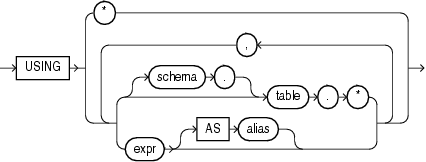FEATURE_VALUE
Description of the illustration feature_value.gif

Description of the illustration feature_value_analytic.gif

Description of the illustration mining_attribute_clause.gif
Description of the illustration mining_analytic_clause.gif
See Also:
"Analytic Functions" for information on the syntax, semantics, and restrictions ofmining_analytic_clauseFEATURE_VALUE returns a feature value for each row in the selection. The value refers to the highest value feature or to the specified feature_id. The feature value is returned as BINARY_DOUBLE.
FEATURE_VALUE can score the data in one of two ways: It can apply a mining model object to the data, or it can dynamically mine the data by executing an analytic clause that builds and applies one or more transient mining models. Choose Syntax or Analytic Syntax:
-
Syntax — Use the first syntax to score the data with a pre-defined model. Supply the name of a feature extraction model.
-
Analytic Syntax — Use the analytic syntax to score the data without a pre-defined model. Include
INTOn, wherenis the number of features to extract, andmining_analytic_clause, which specifies if the data should be partitioned for multiple model builds. Themining_analytic_clausesupports aquery_partition_clauseand anorder_by_clause. (See "analytic_clause::=".)
mining_attribute_clause identifies the column attributes to use as predictors for scoring. When the function is invoked with the analytic syntax, this data is also used for building the transient models. The mining_attribute_clause behaves as described for the PREDICTION function. (See "mining_attribute_clause::=".)
See Also:
-
Oracle Data Mining User's Guide for information about scoring.
-
Oracle Data Mining Concepts for information about feature extraction.
About the Example:
The following example is excerpted from the Data Mining sample programs. For more information about the sample programs, see Appendix A in Oracle Data Mining User's Guide.The following example lists the customers that correspond to feature 3, ordered by match quality.
SELECT *
FROM (SELECT cust_id, FEATURE_VALUE(nmf_sh_sample, 3 USING *) match_quality
FROM nmf_sh_sample_apply_prepared
ORDER BY match_quality DESC)
WHERE ROWNUM < 11;
CUST_ID MATCH_QUALITY
---------- -------------
100210 19.4101627
100962 15.2482251
101151 14.5685197
101499 14.4186292
100363 14.4037396
100372 14.3335148
100982 14.1716545
101039 14.1079914
100759 14.0913761
100953 14.0799737